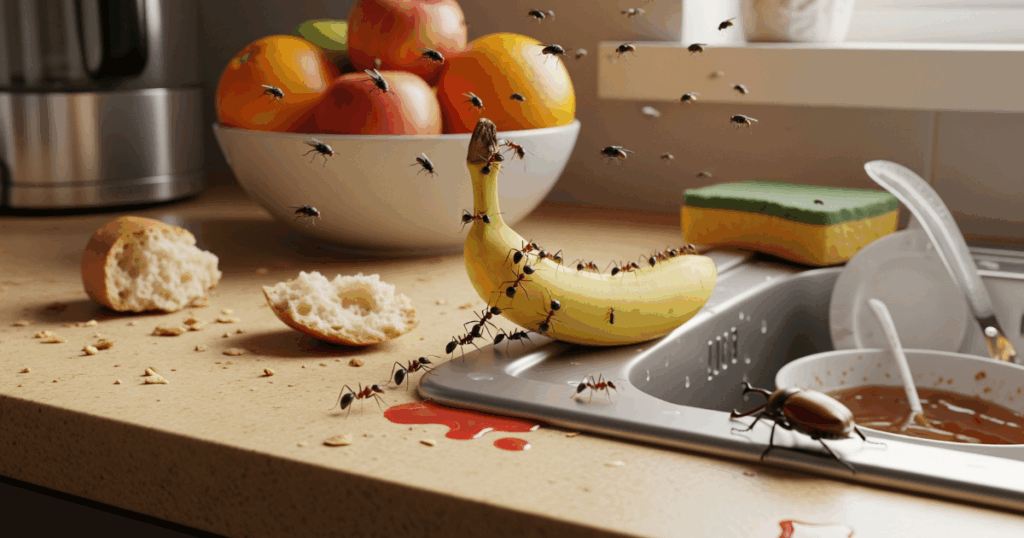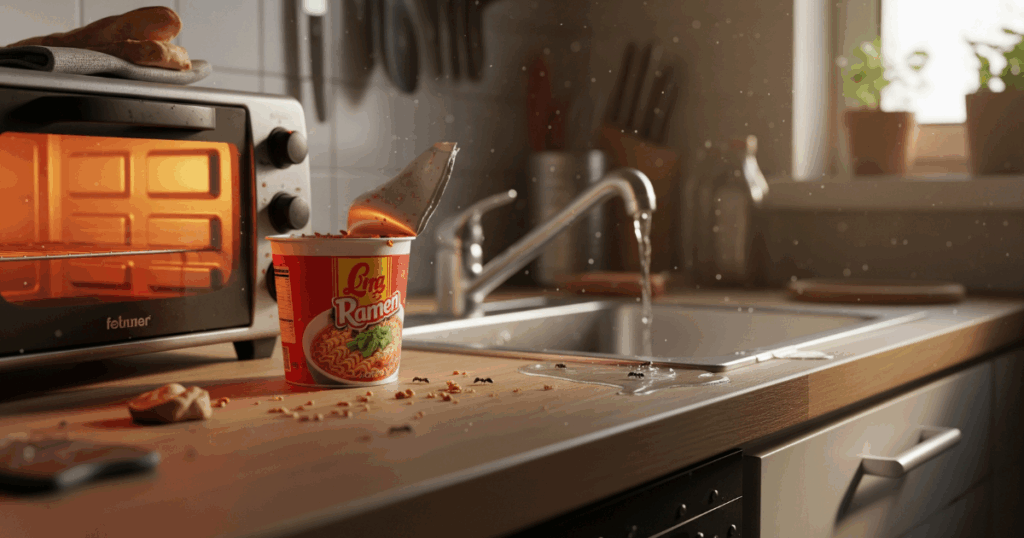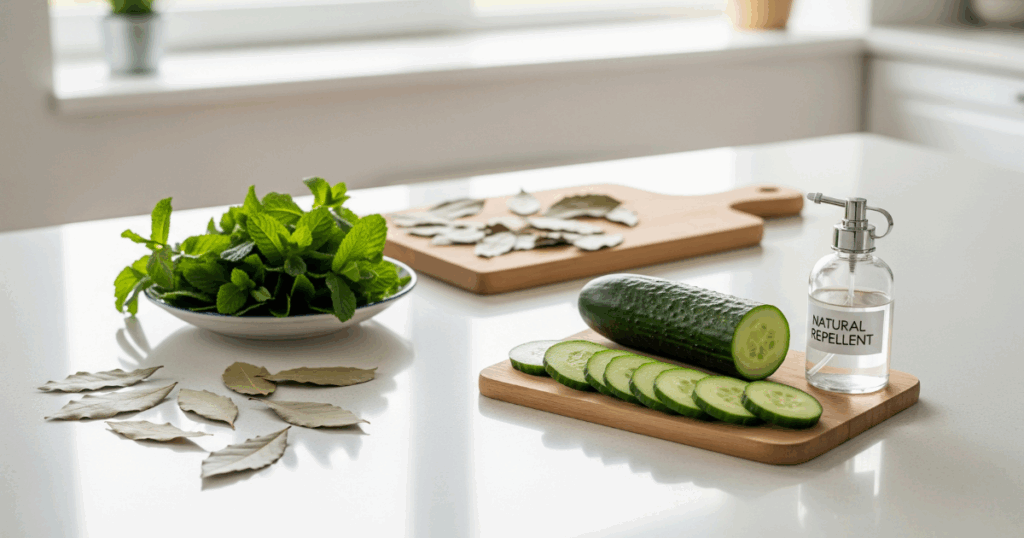Maintaining a hygienic and pest-free kitchen is essential for your family’s health and comfort. Yet, small insects often invade kitchens, drawn by crumbs, water, and warmth. If you’re constantly searching for how to get rid of small insects in kitchen naturally, you’re not alone. Chemical-free solutions do exist, and many can be created from everyday items in your home!
Below, discover common kitchen pests, why they’re there, the risks they pose, and a wealth of natural remedies and prevention tips to help keep your kitchen bug-free for good.
Table of Contents
10 Common Pests and Small Insects in Kitchen

Here’s a snapshot of the most frequent kitchen culprits and where they typically hide:
- Ants – Follow food trails to crumbs, sugar, and spills.
- Cockroaches– Lurk in warm, damp corners and under sinks.
- Fruit Flies – Swarm around ripening fruit, juices, and trash bins.
- House Flies – Enter through open windows, hover near food and waste.
- Pantry Moths – Infest rice, flour, cereals, and dry goods.
- Flour Beetles – Invade unsealed flour and baking supplies.
- Drain Flies – Breed in wet drains and sink traps.
- Weevils – Hide in rice, grains, pasta, and pulses.
- Silverfish – Thrive in dark, moist, paper-rich spots like cupboards.
- Biscuit (Drugstore) Beetles – Nest in spice racks and dried food packs.
Why are insects attracted to the kitchen?

Small insects flock to your kitchen for a few key reasons:
- Abundant food sources: Leftover crumbs, open food packages, and sugary spills entice pests like ants in kitchen, cockroaches, and flies.
- Moisture: Leaky pipes, damp cloths, and wet floors offer water essential for insect survival.
- Warmth: Heat from appliances makes the kitchen a cozy home, especially in cooler weather.
- Shelter: Cracks, cabinets, and clutter offer secluded nesting and hiding spaces, perfect for pests to breed safely.
7 Main Threats Posed by Kitchen Insects
Kitchen insects pose significant risks beyond being mere nuisances. They contaminate food with harmful bacteria, triggering food poisoning and illness, and their droppings can worsen allergies and asthma. Many also spread serious diseases, cause secondary skin infections through bites, damage food packaging leading to waste, and harm property by gnawing on wiring or wood.
Moreover, persistent infestations contribute to mental stress and sleep disruption, reducing overall quality of life. Effective pest control is essential to safeguard health, prevent damage, and maintain peace of mind.
1. Food Contamination
Cockroaches, rodents, ants, and flies can carry harmful bacteria like Salmonella and E. coli onto your food and surfaces, increasing the risk of food poisoning and illness. Even sealed food can become contaminated through damaged packaging or pest contact.
2. Allergic Reactions
Pest droppings, shed skins, and urine contain allergens that can worsen asthma and trigger allergies, especially in children. These microscopic particles become airborne and cause respiratory issues like sneezing, coughing, and skin irritation.
3. Spread of Disease
Certain pests such as flies, rodents, and cockroaches can transmit serious diseases by contaminating food and surfaces with pathogens from sewage and waste. This can lead to illnesses like Salmonellosis, Leptospirosis, and gastrointestinal infections.
4. Secondary Skin Infections
Bites from mosquitoes and flies cause itching, and repeated scratching can break the skin, allowing bacteria to infect wounds. This can result in skin infections such as impetigo or cellulitis, sometimes requiring medical treatment.
5. Damage to Food Packaging
Insects like weevils, beetles, and moths infest and chew through grains and dry food packaging. This spoils food, leads to waste, and sometimes causes additional infestations when larvae hatch inside pantry goods.
6. Property Damage
Rodents and some insects chew on wiring, wood, and insulation in kitchen areas, increasing risks of fire hazards and water leaks. This damage can be costly to repair and compromise home safety.
7. Mental Stress and Sleep Loss
Persistent pest problems cause anxiety, disrupt sleep, and reduce quality of life. Fear of bites, contamination, or infestation often leads to stress, especially when infestations persist despite efforts to control them.
“Find out how to get rid of insects in rice and enjoy long-lasting freshness in your kitchen staples.”
Top 8 Methods on How to Get Rid of Small Insects in Kitchen Naturally?

Natural remedies offer safe, effective ways to remove small insects from your kitchen without harsh chemicals. Neem oil works as a powerful insect repellent and insecticide, while peppermint oil and fresh mint leaves deter ants, flies, and spiders with their strong scent. Bay leaves protect pantry goods by repelling many pest species. Baking soda mixed with onion targets cockroaches naturally by disrupting their digestion.
Cinnamon powder breaks and scent trails, preventing their entry. Fresh basil leaves repel flies and mosquitoes, adding a pleasant aroma to your kitchen. Vinegar traps effectively capture fruit and drain flies. Finally, cucumber slices discourage ants and some cockroaches with their bitter compounds. Combined with good hygiene, these natural methods sustainably keep kitchen pests at bay.
1. Neem Oil
Neem oil is a powerful plant-based insecticide effective against a wide range of pests including cockroaches, ants, and pantry beetles.
How to use: Mix one teaspoon of neem oil with two cups of water and a few drops of liquid soap (to emulsify), then pour into a spray bottle. Mist along baseboards, behind appliances, inside cabinets, and around any area where pests are seen.
2. Peppermint Oil / Mint Leaves
Peppermint oil’s strong aroma overwhelms the senses of ants, spiders, flies, and some beetles, keeping them away from treated zones.
How to use: Add 10–15 drops of pure peppermint oil to one cup of water, shake well, and spray wherever insects congregate, along windowsills, under sinks, and beside trash cans. Alternatively, place fresh mint leaves or peppermint-soaked cotton balls in drawers and behind appliances.
3. Bay Leaves
Bay leaves emit compounds that deter a variety of pantry pests including moths, beetles, and even cockroaches.
How to use: Place dried bay leaves in flour, rice, cereal containers, and in the corners of pantry shelves and cabinets.
4. Baking Soda & Onion
This old-fashioned remedy is especially good for targeting cockroaches.
How to use: Chop a fresh onion, mix it thoroughly with baking soda, and place the mixture in shallow containers or bottle caps in strategic spots (like under the fridge and sink). When cockroaches eat this blend, their digestive systems are disrupted, leading to elimination.
5. Cinnamon Powder
Cinnamon is not just for recipes, it works as a natural ant repellent too!
How to use: Sprinkle cinnamon liberally near ant trails, around food storage zones, and across door thresholds. The strong scent disrupts ant pheromone trails and deters new entries.
6. Fresh Basil Leaves
Basil’s fragrant oils repel flies, mosquitoes, and even some beetles.
How to use: Simply place bowls or bunches of fresh basil leaves on windowsills, near doors, or anywhere flies gather. You can also crush a few leaves for a stronger scent or grow a basil plant in a countertop pot.
7. Vinegar Traps
Fruit flies and drain flies are easily caught and reduced using homemade vinegar traps.
How to use: Pour apple cider vinegar (or regular vinegar) into a small dish, add a drop of dish soap (to break the surface tension), and leave uncovered near fruit bowls or trash. Flies are attracted, land in the mix, and can’t escape.
8. Cucumber Slices / Peels
Cucumber contains chemicals that many ants and some cockroaches dislike.
How to use: Place fresh cucumber slices or thick peels in cupboards, on windowsills, or close to any noticed insect entry points. Refresh every day or two for continuous effect.
5 Other Useful Tips to Prevent Kitchen Pests
Keep these habits in place to keep insects at bay:
- Keep Garbage Organized: Use sealed bins, change bags daily, and separate wet/dry trash.
- Allow Sunlight In: Natural light deters both insects and mold.
- Repair Leaks Promptly: Fix all leaking pipes to remove excess moisture.
- Unclog Drains: Keep drains clear to avoid inviting drain flies and cockroaches.
- Clean Surfaces Nightly: Wipe countertops and sweep floors to get rid of crumbs, spills, and sugary residues.
Check our guide on how to get rid of small insects in bathroom today!
Natural Kitchen Pest Remedies
| Insect Targeted | Natural Remedy | How to Use |
| Ants, Spiders | Peppermint Oil | Spray/cotton balls in corners |
| Roaches | Baking Soda & Onion | Sprinkle in infested areas |
| Flies, Mosquitoes | Basil, Citrus, Lavender | Bowls, sprays, or plant indoors |
| Moths, Beetles | Bay Leaves | Place in pantries/grain containers |
| Fruit Flies | Vinegar Trap | Dish of vinegar and soap |
| Ants | Cucumber Slices | Place on entry points |
Say goodbye to kitchen lizards – take action with these effective, eco-friendly solutions.
Conclusion
Achieving a spotless, insect-free kitchen doesn’t mean exposing your home to harsh chemicals. By understanding how to get rid of small insects in kitchen naturally, you’ll harness the power of everyday herbs, oils, and good hygiene. Regular cleaning, prompt repairs, and strategic natural remedies ensure lasting protection against kitchen invaders, all while maintaining a safe environment for your family. Take these tips to heart, and turning your kitchen into an unwelcoming place for pests will be simple, sustainable, and worry-free.
For comprehensive and hassle-free small insects removal and long-term pest prevention, trust the professionals at Antipest Office. Visit us at the Antipest Office, Our trained technicians use safe and effective methods to protect your home and business. For service bookings and consultations, call us at +91 9819018398 .
How to Get Rid of Small Insects in Kitchen? – FAQs
What is the fastest natural way for How to Get Rid of Small Insects in Kitchen?
The fastest way for how to get rid of small insects in kitchen is to combine daily cleaning, sealing food, and using peppermint or neem oil sprays.
Is there a safe method for How to Get Rid of Small Insects in Kitchen without chemicals?
Yes, using natural remedies like vinegar traps, bay leaves, and basil as part of your plan for how to get rid of small insects in kitchen is both safe and effective.
Can regular kitchen cleaning help with How to Get Rid of Small Insects in Kitchen?
Absolutely! Regularly wiping surfaces and sweeping crumbs greatly improves how to get rid of small insects in the kitchen by removing their main attractants.
Which essential oils work best for How to Get Rid of Small Insects in Kitchen?
Peppermint, neem, and basil oils are most effective for how to get rid of small insects in kitchen naturally and can be sprayed safely in corners and cabinets.
How to Get Rid of Small Insects in Kitchen if they keep coming back?
Seal cracks, repair leaks, and keep pantry items in airtight containers for persistent results in how to get rid of small insects in kitchen.
What kitchen ingredients are useful for How to Get Rid of Small Insects in Kitchen?
Cucumber slices, baking soda, and bay leaves are common kitchen remedies for how to get rid of small insects in kitchen and prevent infestations.
Will homemade vinegar traps really help How to Get Rid of Small Insects in Kitchen?
Yes, vinegar with a drop of dish soap is excellent for how to get rid of small insects in kitchen, especially fruit and drain flies.
Are there any foods that help with How to Get Rid of Small Insects in Kitchen?
Bay leaves, cucumber, and cinnamon placed strategically act as deterrents in your strategy for how to get rid of small insects in kitchen.
How often should I apply remedies for How to Get Rid of Small Insects in Kitchen?
Refresh natural remedies weekly and deep clean at least once a week for ongoing success in how to get rid of small insects in kitchen.
What’s the long-term solution for How to Get Rid of Small Insects in Kitchen?
A combination of prevention, regular cleaning, quick repair of leaks, and consistent use of natural repellents is the best long-term method.

